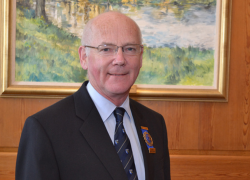- Stay Connected
 Abraham Lincoln
If given the truth, the people can be depended upon to meet any national crisis...
Abraham Lincoln
If given the truth, the people can be depended upon to meet any national crisis...
 Guildford news...
for Guildford people, brought to you by Guildford reporters - Guildford's own news service
Guildford news...
for Guildford people, brought to you by Guildford reporters - Guildford's own news service
Surrey Has England’s Lowest Rate for Jailing Women, Thanks to Rehab Projects
Published on: 17 Feb, 2021
Updated on: 17 Feb, 2021
 The county with England’s lowest rate of imprisoning women is Surrey, mostly due to its Checkpoint rehabilitation schemes for low-level crime.
The county with England’s lowest rate of imprisoning women is Surrey, mostly due to its Checkpoint rehabilitation schemes for low-level crime.
Prison Reform Trust research shows the imprisonment rate for 2019 was just nine per 100,000 women in the county. The police force area with the highest was South Wales with 62 per 100,000 women.
Surrey’s low rate can be attributed to two schemes rolled out across the county.
The Women’s Justice Intervention (WJI) scheme, introduced in 2016, recognises traditional justice isn’t always the best way of preventing re-offending, and working closely with offenders outside the court system can be much more effective, as well as providing greater satisfaction for victims.
A broader scheme for all eligible adults, based on Durham Constabulary’s Checkpoint programme, was launched here in 2019.
Surrey Checkpoint is a deferred prosecution scheme for lower-level offences, which aims to reduce reoffending with targeted interventions while providing greater satisfaction for victims.
That scheme incorporates Checkpoint Plus, with enhanced eligibility and includes women with multiple previous convictions and more complex needs.
Working with the Women’s Centre in Woking and the Police and Crime Commissioner, officers have been able to work with many women who might have been sent to prison, turning their lives around and giving them longer term interventions.
At the time of charge, caution or summons, the male or female offender will be asked if they want to be involved in the scheme as an alternative.
The offender undergoes a needs assessment and the victim is asked what they need from the process. A contract is then drawn up and agreed with the offender. This may include work in the community, counselling, help with mental health, drink or anger management, or a face to face apology.
They may also be signposted to someone for longer-term help with debt or housing issues. If they complete the agreement, the case is closed and isn’t recorded as a criminal conviction.
If they don’t complete the agreement, the file will be sent back to the investigating officer to continue with a caution or charge.
Ailsa Quinlan, Surrey Police Checkpoint manager, said: “To hear Surrey imprisons the lowest number of women in the country is great news and testament to the hard work and determination of all those involved in running the scheme.
“We are very proud the data shows that of the 200 men and women who completed their Checkpoint intervention between January 7, 2019 and January 31, 2020, only 12 had reoffended when we assessed these a year later.
“This is a re-offending rate of 6%, compared to a national average of more than 25%.
“The Checkpoint scheme means women who commit lower-level offences are still able to live with their families and children and are provided with the support they need to get over their trauma and live safely within their communities.
“I would like to say a big thank you to everyone involved. I am really proud of what we have all achieved.”
PCC David Munro said: “The Surrey Checkpoint scheme is among only a few in the country and I am delighted to see all the hard work that has gone into making it a success is really paying dividends.
“One of my key priorities as PCC has been to reduce reoffending in the county which has included a real focus and support for providing alternatives for women in the criminal justice system.
“I strongly believe if the right services are offered to offenders then we can help steer them away from returning to a life of crime, meaning the communities in which they live will also be
“I have seen first-hand the dedication and professionalism of the Checkpoint team and I would like to congratulate all those involved. I look forward to seeing Checkpoint go from strength to strength and continue to make a real difference to our communities.”
The scheme’s success is also highlighted by the emails the team receives:
- It’s RL- you might remember me from about a year ago when you helped to give me a second chance in life to start over with a clean slate.
- But the part I guess I wanted to tell you most about is the fact that this last year, emotionally, I’ve felt the happiest I’ve ever felt in my life.
- I’m so happy with life and I just can’t believe how far I’ve come.
- Really, all of this wouldn’t have been possible without your help and it’s something I am forever grateful for. The fact that you believed in me enough to bat for my corner and give me that second chance means the world. I still think how different things would have been if I had a record or something hanging over my head. I will always be grateful for everything you did to help me, it absolutely changed my life.














Recent Comments